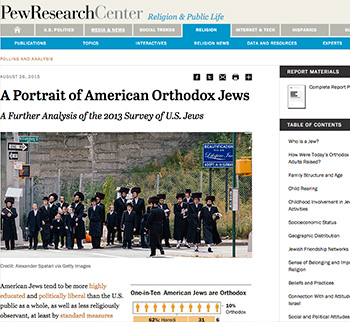The German translation of Michael Hilton’s 1994 book The Christian Effect on Jewish Life has the title Wie es sich christelt, so juedelt es sich – “as things go for Christians, so they go for Jews.” It’s an apt paraphrase of this almost untranslatable adage that reminds us of how much our Judaism, particularly the Ashkenazi (European) kind, is influenced by Christianity.
The latest report on American Jewry, recently released by the Pew Research Centre, doesn’t use the German-Yiddish phrase, but it conveys a similar message in describing the many similarities between Orthodox Judaism and evangelical Christianity in the United States.
Their theologies may be very different, but their sociology and politics are strikingly similar. In general, according to the Pew report, Orthodox Jews resemble white evangelical Protestants more than other Jews. Understandably, for both groups, religion is very important in their lives (over 80 per cent for Orthodox Jews, less than 20 per cent for other Jews). Some 75 per cent of both groups attend worship services regularly, whereas most non-Orthodox Jews only attend very occasionally, and some never.
Evangelicals and Orthodox Jews alike believe that Israel was given to the Jewish People by God. In their expectations of messianic intervention from Heaven, many ultra-Orthodox Jews are opposed to modern Zionism, which set out to bring freedom to Jews on earth. By contrast, the Christian Zionist movement is very strongly supportive of Israel in general and its current government in particular. This trend is now also clearly discernible in Canada.
The success of the International Fellowship of Christians and Jews, founded by Yechiel Eckstein, an Orthodox rabbi, is one of its many manifestations. The Fellowship is said to have raised some $1.3 billion (US) among Christians to help poor Jews in Israel and elsewhere.
And, of course, Orthodox Jews and evangelical Christians both tend to place themselves on the political right, among Republicans in the United States and Conservatives in Canada. Hence the passionate support for Prime Minister Stephen Harper and his party among Jews, particularly, but not only, the Orthodox. Their parents and grandparents were probably Communists or members of other left-wing parties.
As a consequence, the liberal manifestations of Christianity and Judaism – religiously and politically – are receding. Though a plurality of U.S. Jews still identifies as Reform and probably votes Democrat, Orthodoxy is growing. By all accounts, there are similar trends among Muslims in North America and Europe.
Sociologist Steven Cohen speaks of “the shrinking Jewish middle,” because its members intermarry, marry late or not at all, and have fewer children. He anticipates, therefore, a dramatic shift in the composition of North American Jewry, reflecting the growing influence of Orthodox Judaism in the Jewish state and manifest in the clout of its Orthodox political parties.
Ironically, it’s thanks to the liberal forces, particularly in the 20th century, that Jews were able not only to leave the ghetto, but also to be accepted as equals in the countries to which they came. They fled Czarist Russia and Fascist regimes in Europe because of oppression there. With time, however, they’ve come to identify with conservative forces in their chosen countries.
As part of the same trend, Israel has a right-wing coalition government that describes itself as national. It likes to characterize what’s left of the centrist Labor Party that dominated Israel in its earlier decades as the “extreme left.” The tightening grip of Orthodox political parties on Israeli society – again, as part of the government – is of the same ilk.
One of the effects of this trend may be that Jews who are neither religiously Orthodox nor politically conservative will distance themselves altogether from Judaism and the Jewish polity. The trend is there in the Diaspora through assimilation. In Israel it manifests itself through secularization, which will place many Jews on the margins of Israeli society.
Only those with a warped sense of Jewish history and Jewish destiny would rejoice.
